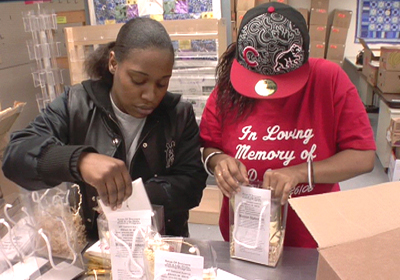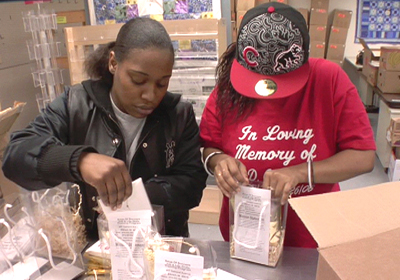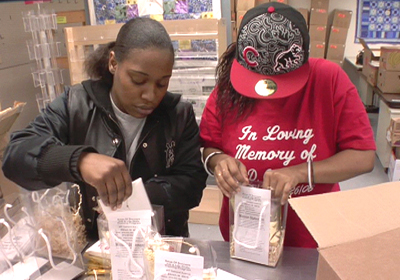
(RNS3-APR21) Members of the Soup of Success program in Elkhart County, Ind., learn job skills while packing gift baskets. For use with RNS-ECON-INDIANA, transmitted April 21, 2009. Religion News Service photo. NOTE: Best quality available.

(RNS3-APR21) Members of the Soup of Success program in Elkhart County, Ind., learn job skills while packing gift baskets. For use with RNS-ECON-INDIANA, transmitted April 21, 2009. Religion News Service photo. NOTE: Best quality available.

(RNS3-APR21) Members of the Soup of Success program in Elkhart County, Ind., learn job skills while packing gift baskets. For use with RNS-ECON-INDIANA, transmitted April 21, 2009. Religion News Service photo. NOTE: Best quality available.
GOSHEN, Ind. — The annual “Family Fest” at Bethany Christian Schools is usually a joyous event as families auction off handmade quilts, furniture and other goods in the annual school fundraiser.
But this year, double-digit unemployment rates overshadowed the event with a sense of anxiety. The event failed to meet last year’s proceeds.
“People … know that there but by the grace of God go I,” school principal Allen Dueck told the PBS program Religion & Ethics NewsWeekly. “It could be me tomorrow or my family member. So I think there’s a real sense of pulling together in ways we can.”
Indiana’s Elkhart County has one of the highest unemployment rates in the country — 20 percent, which is more than twice the national average. And in this overwhelmingly Christian community with a significant Mennonite population, churches are being called upon more than ever to help meet physical and spiritual needs.
This is RV country, where more than 60 percent of the nation’s recreational vehicles have been manufactured. But in tough economic times — when gas prices are unpredictable, people aren’t buying luxury items and banks are restricting loans — the RV industry has collapsed. Factories have been closed or made drastic cutbacks. And the ripple effect is touching virtually everyone.
Many believe the unemployment rate is actually much higher because the official numbers don’t include those who don’t file for unemployment benefits. Here, that means large numbers of out-of-work undocumented Hispanic immigrants and Amish farmers who took factory jobs when they couldn’t make a living on their farms.
Derald Bontrager, president and chief operating officer of the Jayco RV company, which his parents started 41 years ago, has seen production drop from 40,000 campers a year to less than half of that now.
“It’s a gut-wrenching experience to go from 2,200 employees down to 1,100, particularly in this environment because you know that each one of those employees you lay off, that the chance of finding any meaningful employment in the future is almost nonexistent,” Bontrager said.
Bontrager, a leader in his local Mennonite congregation, says he is dealing with a difficult moral equation.
“In many cases, the people that we’re no longer able to employ are the same people that I go to church with on Sunday,” he said. “I see them at the basketball games on the weekend. … But you really have to try to separate that from knowing that we have a real obligation to make sure that we survive as a company in this environment because we’re still employing 1,100 people.”
Churches here are banding together to help the unemployed. One of the most prominent efforts is Church Community Services, a ministry supported by Mennonite, Catholic, mainline Protestant and evangelical congregations. CCS has several programs, including a food pantry that is seeing an all-time high in the number of requests. They also provide emergency assistance to people who can’t pay for rent, utilities and prescription medicine.
“To me, it’s a way of Christians actually putting their hands and their feet to what they believe,” said Dean Preheim Bartel, the program’s executive director. “So it’s not just something in their head, but it’s something they are actually doing. They’re putting their heart and soul into it.”
But resources are being stretched thin. The agency has been seeing between 300 and 400 new clients every month; many have worked their entire lives and never needed outside help.
(BEGIN OPTIONAL TRIM)
Another program the agency sponsors is a job-training program for women called “Soup of Success,” or SOS. It teaches women how to be good employees as they work in a small business packaging dry soup and cookie mixes into gift baskets.
“Sometimes as an agency we can’t provide the tangible things people need, but … we can treat them with dignity and respect and we can provide them with an atmosphere that’s hopeful,” Preheim Bartel said.
(END OPTIONAL TRIM)
Requests are also dramatically up at the Maple City Health Care Center, which provides sliding-scale discounts for people who can’t afford medical care. Until now, they’ve always required patients to pay at least 10 percent of their costs.
Patients are now asked to volunteer at a local charity in exchange for $10 credit toward their medical bills. He said the program has been especially important for the area’s growing number of unemployed Latino immigrants, many of whom are undocumented.
“Those people don’t have access to food stamps, they don’t have access to unemployment (benefits), they don’t have a safety net that other unemployed people do, and they’re often socially much more isolated. They don’t have generations of connections in the community,” said Dr. James Gingerich.
At the same time, local churches that support these community ministries are facing their own budget shortfalls — even as they are being asked to do more. Church leaders say the situation has taken a heavy spiritual toll.
At Elkhart’s Associated Mennonite Biblical Seminary, they’re teaching future pastors how to counsel people affected by the economic crisis. It starts with listening, said seminary President Nelson Kraybill.
“You don’t come with quick and easy answers and anyone who does, saying `well, this is what you ought to do,’ or `this is where you made a mistake,’ if you start with that, I think you have defeated the entire purpose of the pastoral encounter,” he said.
Kraybill believes the entire community is learning important spiritual lessons.
“When I have my bank account and my retirement and secure employment, and my mortgage pretty well paid off, it’s easy for me to get spiritually smug and think, I don’t need God,” he said.
“It’s in the people around us who are the most vulnerable where we are going to see the face of God.”




